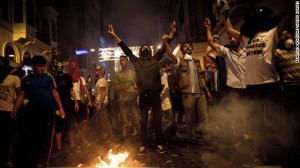
Turkish protesters shout slogans next to a bonfire during a protest on Istiklal Avenue in Istanbul on July 8, 2013.
Istanbul (CNN) — Turkish counter-terror police launched pre-dawn raids against scores of targets across Turkey’s largest city Tuesday.
At least 30 suspects were detained, Turkey’s semi-official Anatolian Agency reported, in connection with anti-government protests that erupted in Istanbul in late May.
What’s driving unrest and protests in Turkey?
The Turkish Interior Ministry, the Istanbul governor’s office and Istanbul police declined to comment on the raids when contacted by CNN.
But relatives and friends of some of those detained described the police raids while waiting outside Istanbul’s main police headquarters for news about their loved ones.
“Ten to 13 of them (police officers) came around 5 a.m.,” said Utku Caybas, a student at Istanbul University who said his 20-year old roommate, Cem Eraslan, was detained Tuesday morning.
“They took four computers, our notebooks and some cameras,” Caybas added.
Tugce Ozcelik told CNN police raided her family’s home and detained her 19-year old brother Deniz at 5 a.m.
“They showed a picture of my brother and the search warrant to my father,” Ozcelik said.
She said her brother had recently completed high school and taken a university entrance exam.
“As a family we were all there at the Gezi events. We support the movement… they think that they can scare us from going out into the street but they can’t,” Ozcelik said.
She was referring to an unprecedented series of protests that erupted after Turkish riot police repeatedly attacked a peaceful sit-in in Istanbul’s Gezi Park in May.
Demonstrators had initially organized a small Occupy Wall Street-style protest against government plans to bulldoze the park and replace it with a shopping mall.
For several days, riot police repeatedly attacked sit-in participants with pepper spray, tear gas and water cannons.
On May 30, demonstrators began fighting back, erecting barricades and attacking security forces with stones, bottles and slingshots.
The mass civil disobedience and rioting quickly spread to other cities and towns across the country.
Thousands of people were wounded in clashes, and at least one police officer and five demonstrators were killed.
The most recent fatality was 19-year-old Ali Ismail Korkmaz, who died at a hospital last week after being beaten into a coma during demonstrations in the city of Eskisehir on June 2. Turkish media organizations have released security camera footage from that night showing men with gas masks and clubs chasing protesters and beating them in the streets of Eskisehir.
Turkish Prime Minister Recep Tayyip Erdogan has repeatedly denounced the protests, calling demonstrators “terrorists” and “vandals.”
Initially, Erdogan accused the demonstrators of being part of an international conspiracy aimed at toppling his elected government. He claimed that protests in both Turkey and Brazil were organized by the same shadowy “center.”
Over the last week, Erdogan has expanded the scope of the alleged conspiracy, claiming that mass protests and a military coup that toppled the elected government in Egypt were somehow linked to the demonstrations in Turkey.
Turkish security forces have largely succeeded in crushing the demonstrations through widespread use of tear gas, water cannons and a growing number of arrests.
But in doing so, the Turkish police and government have come under fire from international organizations like the European Parliament and Amnesty International for “excessive use of force.”
Last week, a coalition of medical organizations including the Boston-based Physicians for Human Rights and the World Medical Association issued an appeal for an international ban on the sale of tear gas to Turkey.
“Police have systematically used tear gas as a weapon on hundreds of thousands of demonstrators, firing tear gas canisters and capsules directly at protesters at close range,” the medical groups wrote in an open letter addressed to Erdogan.
They also called upon the Turkish government to “prohibit all attacks on medical personnel who provide emergency assistance to injured protestors.”
Turkey’s challenge: Find compromise before violence expands
16 July 2013
Source: edition.cnn.com



